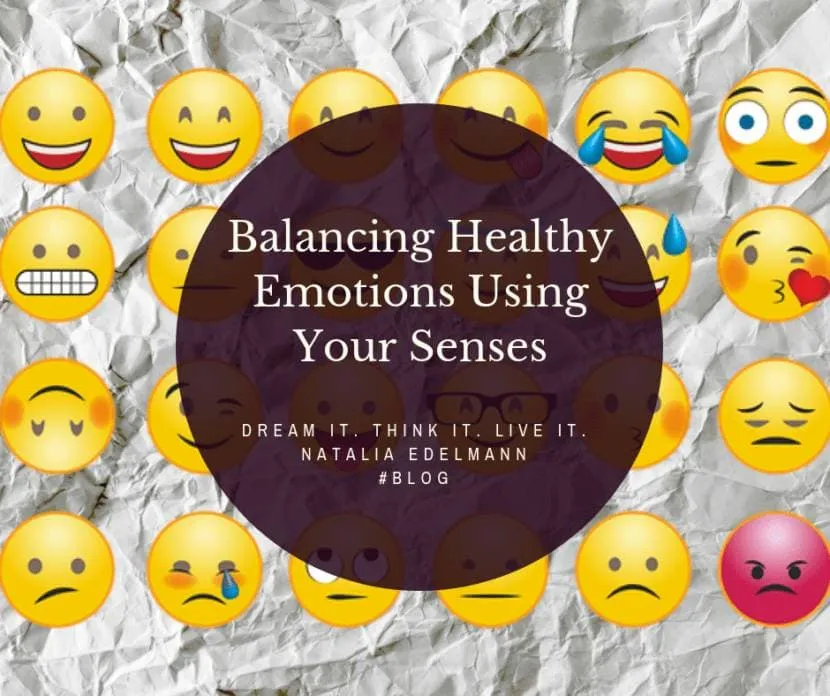I had the opportunity to speak in The Ambitious Quarter Life Females – Thriving with Confidence Clarity & Courage Facebook Group the other day about this very topic.
Emotional Support is also something I’m focusing on in my Essential Oils & Holistic Wellness Group for the month of March.
So what am I talking about specifically?
I’m talking about emotions, what they are, how they are processed and how we can use our senses to help balance emotions so that we can start to bring more awareness to our triggers and take control.
Being able to balance your emotions will help you to make better decisions, have better relationships and ultimately achieve greater success and happiness in all aspects of your life.
If you want to catch the full live training on Life Strategies With Nat, Episode 12, join my free Life Fulfillment Academy Community on Facebook and click below.
What is an emotion?
Recall that an emotion is a mental state associated with thoughts, feelings, behaviours, etc. They are part of your experiential system, your core consciousness system.
Psychologist Robert Plutchik says there are 8 basic emotions, which are grouped in polar opposites, and are the basis for all other emotions.
- Joy or Sadness
- Trust or Disgust
- Fear of Anger
- Anticipation or Surprise
He created a wheel of emotions which illustrates either extreme pleasure or displeasure as it relates to each emotion, in other words, the varying intensities of the basic emotions.

14580821
How do we process emotions?
Emotions and memories are not just stored in the brain, they are stored in your cells – this is the theory of cellular memory.
There are case studies of organ recipients feeling or experiencing something from their organ donor. The Liver for example, is responsible for eliminating toxins, and this is said to be where a toxic release point is.

The limbic system is often referred to our emotional brain because it’s responsible for handling emotional responses, hormone function, behaviour, motivation, long-term memory, and sense of smell.
Other parts of your brain that also reside in within the limbic system are:
- Hippocampus – responsible for forming short- and long-term memories.
- Amygdala – perceives emotions such as anger, fear, and sadness; plays a role in controlling aggression; helps store memories of events and emotions; also plays a role in sexual activity and libido.
- Hypothalamus – controls reproduction, sleep patterns, and body homeostasis.
- Thalamus – relays sensory information to the cerebral cortex.
How to use your senses to balance your emotions?
Touch
You can use an anchor to help you change a habit that is making you feel a certain way. Eating out of boredom or stress is an example.
- Think of the anchor – index finger to thumb, for example
- Choose the behaviour – what behaviour do you want to be able to have: not eating something as a reaction to boredom or stress, in this example
- Envision the behaviour – what does the new behaviour look like – get really clear
- Amplify – really step into it – what sounds do you hear, what sights to you see?
- Install the anchor – immediately see yourself doing the action you decided on in step 2
- Take a break
- Try the anchor – are you eliciting your new feeling? If not, repeat from step 2 until you do.
- Repeat the anchor
Sight
Visualizing or physically seeing something that elicits a better feeling
Make time to daydream and have a sacred space in your home or outside where you can go to.
For me it’s the water, if I can see the water, I feel so much better about everything.
Smell
Scents are said to be the most effective because the limbic system is responsible for sense of smell. It’s why when you smell your favourite food your mouth waters and you feel hungry. Or when I smell Jasmine and I think of my childhood and my mom
Aromatherapy using essential oils can impact emotions – when you breathe in odorant molecules that are floating through the air into your nose, it elicits a response, just like when I was telling you about Jasmine. Why does this happen?
Well, the odor molecules land on tiny hairs inside your nose called cilia. The cilia then start to vibrate, generating an electrical signal. The signal travels up to a receptor cell, which starts to bundle packets of smell information, and sends projections into the olfactory bulb. The smell information is even further bundled into packets that travel to the limbic system via pyramidal cells. Here in the limbic system, an emotional shift occurs in response to the smell. Shout out to Lindsey Elmore for this info!
Hear
Practice listening – hearing is a key part of communication, but can also elicit a response like when you hear a loud bang vs when you hear a baby laughing
Be the last to speak and the first to listen, and you will find that your communication skills will get stronger, you’ll start to have more patience and feel calmer.
Taste
Tasting something that is flavourless, dull and boring, is likely going to make you feel this way. When you have something spicy, it’s like it awakens all your senses – you start feeling excited even. Choose foods that elicit happy feelings like fruits and veggies. Sure, chips tastes good, but they don’t leave you feeling particularly nourished and alive, do they?
I hope that this has helped you learn a few techniques on how to balance your emotions using your senses. If you have any questions about anything or about getting started with essential oils, please feel free to comment below or reach out to me directly.
Get the Insider News & Blog updates right to your inbox.
[wd_hustle id=”email-subscribe” type=”embedded” css_class=””]




